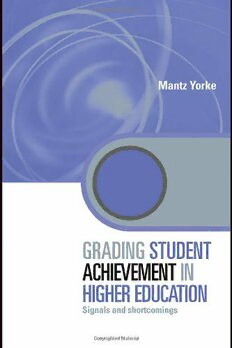Download Grading Student Achievement in Higher Education: Signals and shortcomings (Key Issues in Higher Education) PDF Free - Full Version
Download Grading Student Achievement in Higher Education: Signals and shortcomings (Key Issues in Higher Education) by Mantz Yorke in PDF format completely FREE. No registration required, no payment needed. Get instant access to this valuable resource on PDFdrive.to!
About Grading Student Achievement in Higher Education: Signals and shortcomings (Key Issues in Higher Education)
A lot hangs on the summative grades that students are given. A good degree opens doors which otherwise might remain closed. Yet, as higher education is now a mass rather than an elite system, what is expected of its graduates is different from the expectations of previous generations. Students are expected not only to be able to demonstrate high standards of academic achievement, but also a variety of capabilities that have at different times been given labels such as ‘generic skills’ and ‘transferable skills’. These abilities are difficult to grade for a variety of reasons and some graduates may be losing out because their particular strengths are given insufficient acknowledgement in current summative assessment practices.Using the UK honours degree classifications as a case study, this book appraises the way in which summative assessment in higher education is approached and shows that the foundations of current practices (in the UK and elsewhere) are of questionable robustness. It argues that there is a need to widen the assessment frame if the breadth of valued student achievements is to be recognised adequately.
Detailed Information
| Author: | Mantz Yorke |
|---|---|
| Publication Year: | 2007 |
| ISBN: | 9780203939413 |
| Pages: | 254 |
| Language: | English |
| File Size: | 1.868 |
| Format: | |
| Price: | FREE |
Safe & Secure Download - No registration required
Why Choose PDFdrive for Your Free Grading Student Achievement in Higher Education: Signals and shortcomings (Key Issues in Higher Education) Download?
- 100% Free: No hidden fees or subscriptions required for one book every day.
- No Registration: Immediate access is available without creating accounts for one book every day.
- Safe and Secure: Clean downloads without malware or viruses
- Multiple Formats: PDF, MOBI, Mpub,... optimized for all devices
- Educational Resource: Supporting knowledge sharing and learning
Frequently Asked Questions
Is it really free to download Grading Student Achievement in Higher Education: Signals and shortcomings (Key Issues in Higher Education) PDF?
Yes, on https://PDFdrive.to you can download Grading Student Achievement in Higher Education: Signals and shortcomings (Key Issues in Higher Education) by Mantz Yorke completely free. We don't require any payment, subscription, or registration to access this PDF file. For 3 books every day.
How can I read Grading Student Achievement in Higher Education: Signals and shortcomings (Key Issues in Higher Education) on my mobile device?
After downloading Grading Student Achievement in Higher Education: Signals and shortcomings (Key Issues in Higher Education) PDF, you can open it with any PDF reader app on your phone or tablet. We recommend using Adobe Acrobat Reader, Apple Books, or Google Play Books for the best reading experience.
Is this the full version of Grading Student Achievement in Higher Education: Signals and shortcomings (Key Issues in Higher Education)?
Yes, this is the complete PDF version of Grading Student Achievement in Higher Education: Signals and shortcomings (Key Issues in Higher Education) by Mantz Yorke. You will be able to read the entire content as in the printed version without missing any pages.
Is it legal to download Grading Student Achievement in Higher Education: Signals and shortcomings (Key Issues in Higher Education) PDF for free?
https://PDFdrive.to provides links to free educational resources available online. We do not store any files on our servers. Please be aware of copyright laws in your country before downloading.
The materials shared are intended for research, educational, and personal use in accordance with fair use principles.

